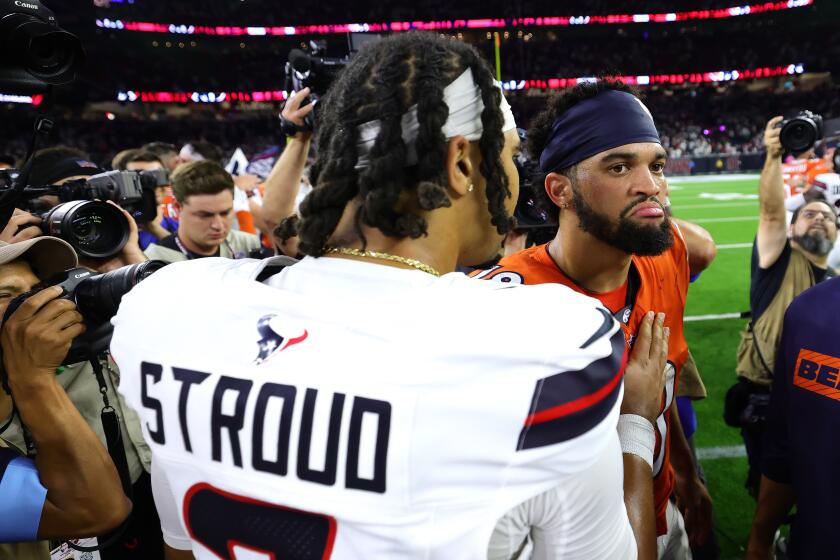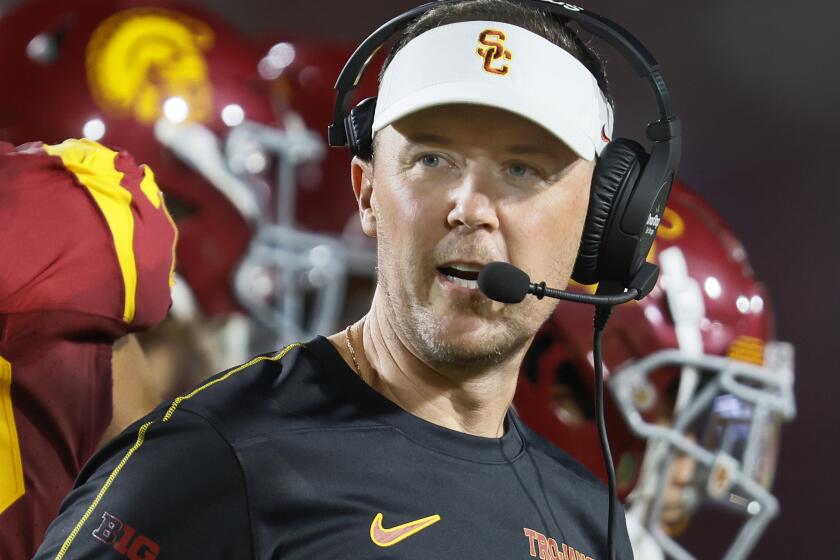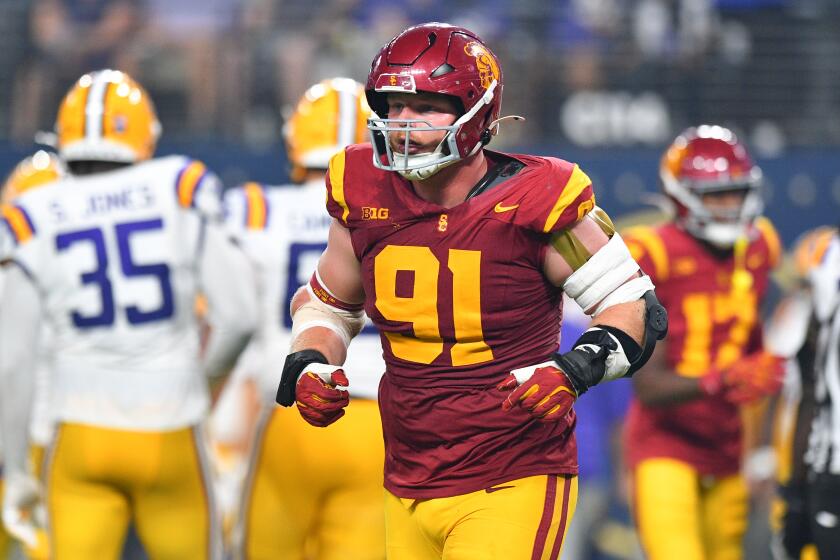Coming of age
Some of what makes Taylor Mays a precociously talented safety for USC can be traced back to when he was 13.
There were months of intense study. Repetitive practice. And memorization of every nuance of his responsibilities.
Mays was preparing for his bar mitzvah.
The experience of reading from the Torah shaped him in ways he did not anticipate, ways that have helped him thrive as a person and an athlete.
“I don’t think at the time I really understood what that meant,” Mays said of the ceremony that is a Jewish rite of passage into adulthood. “Now, looking back on it, I feel like I have come a long way in regard to maturity and becoming an adult.
“I think that helped me do it.”
Mays’ mature approach, and his considerable talent, helped him move seamlessly into USC’s starting lineup after junior Josh Pinkard suffered a season-ending knee injury in the opener against Arkansas. The hard-hitting Mays, who was selected to several freshman All-American teams, will be a key component for the eighth-ranked Trojans when they play third-ranked Michigan in the Rose Bowl on New Year’s Day.
“He’s a high achiever, driven, all of the positive things you could say about a young man,” USC Coach Pete Carroll said. “He wants to be great and he’s willing to do what it takes to be great. He doesn’t just talk about it, he does it.”
Mays, 18, took cues about drive and achievement from his parents.
His mother, Laurie, is an executive vice president for Nordstrom; his father, Stafford, a former NFL defensive lineman, is an executive for Microsoft.
“They have molded who I am,” Mays said. “I have seen them as examples.”
Mays said that being the son of a white, Jewish mother and an African American father in Seattle made him “kind of a rarity,” an appropriate description for Mays on the athletic field as well.
At 6 feet 4 and 225 pounds, Mays is larger than many safeties. A state sprint champion, he is equally adept at running down quarterbacks, running backs and receivers or pulverizing them in head-on collisions.
Mays’ athletic prowess was evident early in life.
“Even when he was 2, he had that build,” his mother said.
Mays begged to play tackle football in elementary school but his father forbid it. Stafford Mays played in college at Washington and in the NFL for nine years. He did not want his oldest son to play a sport so hard on the body until he was in the eighth grade.
But Stafford relented after watching sixth-grader Taylor play defense for a soccer team.
“He was annihilating guys that wanted to go to the goal,” Stafford recalled. “I just knew, ‘This is it.’ ”
Taylor played football the following year with enthusiasm that bordered on obsessive. Once, his father came home and found him studying. The subject was math and Taylor was poring over equations. With his helmet on.
“I go, ‘Uh-oh, we’re in trouble,’ ” Stafford said, laughing.
It wasn’t always lighthearted. Taylor cried during the car ride home from one of his first football practices. Stafford had watched the workout and he told his son that he was not showing the necessary intensity and aggression to play defensive end.
“When we got home, on the cement, he made me pass rush against him,” Taylor said, chuckling at the memory. “He thought he was Jackie Slater or something.”
The next year, as he was getting ready for high school, Mays’ parents let him set his own path. Taylor chose to attend O’Dea High, an all-boys Catholic school with a rich athletic tradition.
“They had a good football program, a structured program,” Mays said. “There were really no other places besides there that I wanted to go.”
At O’Dea, Mays decided to give up baseball, a sport at which he excelled. The decision rankled his father so to placate Dad, Mays went out for track -- and won state titles in the 100- and 200-meter sprints as a sophomore in 2004.
Meanwhile, he became one of the nation’s top college football prospects and, he said, “loved every second” of his high school experience.
“There was always a maturity about him when it came to his schoolwork and football,” said Monte Kohler, who has coached football at O’Dea for 22 years. “But as hard as he worked to prepare for a game and other things, he could still be a kid.”
Before his senior year, Mays began narrowing his potential college choices. Washington was in the mix because of location and his father’s connection. Ultimately, though, it came down to Michigan and USC.
Mays, a Charles Woodson fan, was leaning toward attending Michigan, the 1997 Heisman Trophy winner’s alma mater, after a trip to Ann Arbor in the summer of 2005.
But when he visited a USC practice during training camp he became enamored of the Trojans. His father had played for the Minnesota Vikings when a young Carroll was a member of Bud Grant’s staff, and Stafford Mays remembered the energy and fun the coach brought to the game.
Taylor Mays, however, said a challenge from Athletic Director Mike Garrett closed the deal.
“He said, ‘If you’re scared of competition, if you’re scared you’re going to get lost in the shuffle, don’t come here because competition only brings out the best,’ ” Mays recalled. “That turned it over for me. In my mind I said, ‘All right. I’m coming here.’ ”
Mays arrived on campus last summer and began studying film and the playbook. Shortly after training camp began in August, he was in the safety rotation with Pinkard and sophomore Kevin Ellison.
“I never felt physically intimidated by anything, but mentally there was so much stuff that I had no clue about,” he said.
Two weeks after Pinkard was injured against Arkansas, Mays started for the first time in USC’s next game, against Nebraska. He showed flashes over the next four games -- intercepting a pass on the final play to preserve a win over Washington State -- but mostly played conservatively.
“It was not until midyear that you understood that he understood,” Carroll said.
Mays made a game-high 11 tackles against Oregon State, intercepted passes against Oregon and California, and delivered several bone-jarring hits against Notre Dame.
“Watching them play and seeing some of the hits they’ve made, they get me out of my seat,” NFL Hall of Famer Ronnie Lott, an All-American at USC, said of Mays and Ellison.
Without prompting, Mays credits defensive backs coach Rocky Seto, Carroll, Ellison, Pinkard, Lott, Troy Polamalu, Darnell Bing and just about every other safety in USC history for helping him progress.
He also notes that his journey has just started, that there is more maturing to be done.
“It’s like I’m just scratching the surface of everything,” he said.
*
*
ROSE BOWL
USC (10-2) vs. Michigan (11-1)
Monday at Pasadena
2 p.m., Channel 7
Go beyond the scoreboard
Get the latest on L.A.'s teams in the daily Sports Report newsletter.
You may occasionally receive promotional content from the Los Angeles Times.




